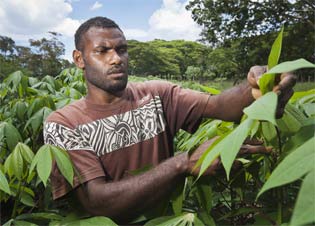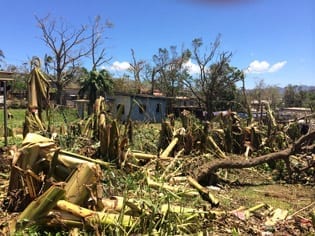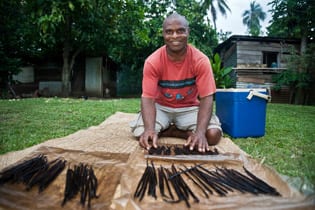Interview with Oliver Iato, Senior Extension Officer, Farm Support Association
 Interview with Oliver Iato, Senior Extension Officer, Farm Support Association
Interview with Oliver Iato, Senior Extension Officer, Farm Support Association
What was your experience like last Friday night?
For me, it was my first time experiencing a cyclone this strong. I hadn’t experienced wind like this. It was very strong. It really made a lot of damage.
Where I stayed, lots of trees fell down. Some branches broke and fell, neighbours’ roofs flew off, some backyards were damaged as trees, island cabbage, manioc and yams in people’s backyard gardens were destroyed. It was a very strong cyclone
I was at home. I thought it would take off the roof. On one side, there was lots of water overflowing from the creek. Water came into my house, half a meter deep. Everything was wet. Water came inside lots of houses in my area, both from the rain and from the creek flooding.
You could hear the noise through the windows. The window covers were vibrating strongly. The wind came in every direction; you could even hear the different directions that the wind came from.
And have you heard anything from Tanna?
I spoke with the [government] agriculture extension officer who went on an assessment visit to Tanna. He said that everything in Tanna is like a desert. Lots of the vegetation is destroyed. In people’s gardens, their sandalwood trees have fallen. The fruit on coffee plants have all gone, when normally people would be harvesting soon.
So what are the likely impacts of Cyclone Pam on the farmers you have worked with on Tanna?
 Root crops are people’s main food. If yam, cassava and taro haven’t been destroyed, they need to be quickly harvested before they rot from flooding. They will need to be eaten quickly within a week or they will be spoiled.
Root crops are people’s main food. If yam, cassava and taro haven’t been destroyed, they need to be quickly harvested before they rot from flooding. They will need to be eaten quickly within a week or they will be spoiled.
Food is short.
The cyclone has come at a very bad time; it’s around the harvest period. Somehow the farmers have to harvest their vegetables as they don’t have a way to keep them.
Farmers who had planted vegetables would have lost all their crops. If they kept local seeds, they should plant things like corn, pumpkin and choko now for food security in two months time, while waiting for food aid.
There may be a food gap. Starting from now, there may be a gap of two to three months before vegetables can be harvested. Root crops will be worse as they take seven to nine months before harvesting. For leafy vegetables, it’ll be two to three months.
That’s why with the agriculture cluster now, we’re working very hard to work to get some food like rice, tinned fish, biscuits and flour out so that farmers can have it to last for the next 3-4 months while waiting for their root crops to recover.
Tell me about the Food Security and Agriculture Cluster *
I have joined the agriculture cluster. We have different roles; some of us are working on where to get planting materials and how to send them to the islands and distribute them. Others are working on food aid and identifying agriculture tools and seeds so that if we have money we can buy them and send to the farmers. The livestock group is raising awareness on how to care for the animals.
We have some key messages that we are giving out to the farmers. I just came from the radio station where I was giving the key message that if farmers have planting material like manioc, kumala, taro, island cabbage, they have to automatically plant. It’s what farmers should do after a cyclone hits.
It was a big cyclone that most people didn’t expect. People are now just waiting for outside assistance. We have to encourage them. When you go around the islands there is so much damage. People are in shock. They cannot automatically go to the garden and restart their work so we are encouraging people on the radio what they have to do to get back to normal life.
What about the vanilla farmers that you work with?
 We haven’t heard reports, but we expect that vanilla farmers have also had their crops destroyed. Lots of vanilla farmers would have lost their vanilla plot. It’s sad news for us all because they have just pollinated their flowers and the beans would have been ready for harvest in May or June. With less trees now, the sun is stronger and will have damaged the vanilla plants.
We haven’t heard reports, but we expect that vanilla farmers have also had their crops destroyed. Lots of vanilla farmers would have lost their vanilla plot. It’s sad news for us all because they have just pollinated their flowers and the beans would have been ready for harvest in May or June. With less trees now, the sun is stronger and will have damaged the vanilla plants.
And the Young Farmers?
Our Young Farmers started a nursery. If they managed to save the nursery, it would be ok but if not, it would be damaged by the strong wind. They won’t be able to recover quickly. They’ll have to start from zero with another nursery. Lots of their taro could be damaged. Kava is a cash crop for them. Lots of last year’s young farmers need to find a way to sell their three year kava. If it’s saved, they must dig it out and find a way to quickly sell it for income. If the wind disturbed the roots and the sun heated the plant, it would be spoiled.
I heard that the Napil training centre roof flew off. The community used it as an evacuation centre but the wind took the roof off. It’s really sad news from Napil. I think it’ll affect the students a lot. They should have time inside class to learn farming theory. Now they won’t have a place to learn and have their classes and discussions. It’ll be hard for them to come back to the start.
And the women’s groups?
Women’s group gardens will be damaged. Any assistance will help them, especially seeds will help them to recover and make a small garden to get an income through farming crops and livestock. They will need assistance in some place. They should have help in terms of planting materials, seeds, tools. My hope is that support can reach them to help everyone recover better than how they were before the cyclone.
So how do you think farming can help Vanuatu recover from Cyclone Pam?
Farming can help Vanuatu recover from Cyclone Pam. Vanuatu society lives mostly off farming. Now with such a big disaster, lots of people have lost hope. Most get their money from farming; the small scale farmers on the islands sell vegetables and food crops to get money to access household basics, health and education. Farming really helps our communities out. It’s the main source of income, so by this time with Cyclone Pam, we must find a way to address education as most people will not afford to pay school fees with their farming destroyed.
The cluster system is part of the UN mandated humanitarian coordination system. Vanuatu’s Food Security and Agriculture Cluster comprises government and non-government agencies working on food and agriculture issues in disaster preparedness and response. There are other clusters dealing with WASH, education, health, gender and protection





